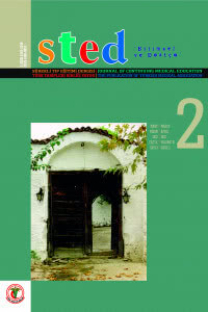Emzirmenin Sürdürülmesi ve Başarısında Anahtar Faktör: Öz-Belirleme Kuramına Dayalı Emzirme Motivasyonu
The Key Factor in Continuation and Success of Breastfeeding: Breastfeeding Motivation Based on Self-Determination Theory
___
- Lau CY, Fong DY, Choi AY, Ng JW, Sing C, Tarrant M. Development and measurement properties of the Chinese breastfeeding self-regulation questionnaire. Midwifery. 2017;44:24-34.
- Racine EF, Frick KD, Strobino D, Carpenter LM, Milligan R, Pugh LC. How motivation influences breastfeeding duration among low-income women. Journal of Human Lactation. 2009;25(2):173-81.
- Kestler-Peleg M, Shamir-Dardikman M, Hermoni D, Ginzburg K. Breastfeeding motivation and Self- Determination Theory. Social Science & Medicine. 2015;144:19-27.
- Kadzikowska-Wrzosek R. Autonomous motivation, self-efficacy and psycho-physical well-being in a group of Polish breastfeeding mothers: preliminary communication. Archives of Psychiatry and Psychotherapy. 2016;3:58-67.
- Stockdale J, Sinclair M, Kernohan G, McCrum- Gardner E, Keller J. Sensitivity of the breastfeeding motivational measurement scale: a known group analysis of first time mothers. PloS one. 2013;8(12):e82976.
- Stockdale J, Sinclair M, Kernohan G, Keller J. Understanding Motivational Theory and the Psychology of Breastfeeding. In: Bryar R, Sinclair M, editors. Theory for midwifery practice: Palgrave Macmillan; 2011.
- Thulier D, Mercer J. Variables associated with breastfeeding duration. Journal of Obstetric, Gynecologic, & Neonatal Nursing. 2009;38(3):259-68.
- Victora CG, Bahl R, Barros AJ, França GV, Horton S, Krasevec J, et al. Breastfeeding in the 21st century: epidemiology, mechanisms, and lifelong effect. The Lancet. 2016;387(10017):475-90.
- Fombong FE, Olang B, Antai D, Osuorah CD, Poortvliet E, Yngve A. Maternal Socio-demographic Determinants of Exclusive Breastfeeding Practice in Cameroon. American Journal of Food and Nutrition. 2016;4(4):83-92.
- McAndrew F, Thompson J, Fellows L, Large A, Speed M, Renfrew M. Infant Feeding Survey 2010. Health and Social Care Information Centre www hscic gov uk/article/3895/Infant-Feeding-Survey- 2010. 2015.
- Quigley M, Carson C, Sacker A, Kelly Y. Exclusive breastfeeding duration and infant infection. European Journal of Clinical Nutrition. 2016:1-8.
- Ryan RM. Control and information in the intrapersonal sphere: An extension of cognitive evaluation theory. Journal of personality and social psychology. 1982;43(3):450.
- Morsünbül Ü. Özerklik ve Ruh Sağlığına Etkisi. Psikiyatride Güncel Yaklaşımlar. 2012;4(2).
- Şad SN, Gürbüztürk O. İngilizce hazırlık öğrencilerinin özbelirleyicilik düzeylerinin çeşitli değişkenlere göre incelenmesi (İnönü Üniversitesi Örneği). Kuram ve Uygulamada Eğitim Yönetimi. 2009;59(59):421-50.
- Özkubat S, Demiriz S. Çevreye Karşı Motivasyon Ölçeği’nin Okul Öncesi Öğretmen Adayları Üzerinde Geçerlik Güvenirlik Çalışması. Amasya Üniversitesi Eğitim Fakültesi Dergisi. 2013;2(1):87- 114.
- Gagné M, Deci EL. Self‐determination theory and work motivation. Journal of Organizational behavior. 2005;26(4):331-62.
- Kara A. İlköğretim birinci kademede eğitimde motivasyon ölçeğinin Türkçeye uyarlanması. Ege Eğitim Dergisi. 2008;9(2).
- Deci EL, Ryan RM, Williams GC. Need satisfaction and the self-regulation of learning. Learning and individual differences. 1996;8(3):165-83.
- Deci EL, Ryan RM. Intrinsic motivation: Wiley Online Library; 1975.
- Ryan RM, Deci EL. Intrinsic and extrinsic motivations: Classic definitions and new directions. Contemporary educational psychology. 2000;25(1):54-67.
- Gömleksiz MN, Serhatlıoğlu B. Öğretmen adaylarinin akademik motivasyon düzeylerine ilişkin görüşleri. Türkiye Sosyal Araştırmalar Dergisi. 2014;173(173):99-128.
- Macvean A, Robertson J, editors. Understanding exergame users' physical activity, motivation and behavior over time. Proceedings of the SIGCHI Conference on Human Factors in Computing Systems; 2013: ACM.
- Lin L, Zhang T. Playing exergames in the classroom: Pre-service teachers’ motivation, passion, effort, and perspectives. Journal of Technology and Teacher Education. 2011;19(3):243-60.
- Chentanez N, Barto AG, Singh SP, editors. Intrinsically motivated reinforcement learning. Advances in neural information processing systems; 2004.
- ISSN: 1300-0853
- Yayın Aralığı: Yılda 6 Sayı
- Başlangıç: 1992
- Yayıncı: TÜRK TABİPLERİ BİRLİĞİ
Cerrahi Hemşirelerde Merhamet ve Kültürlerarası Duyarlılığı Etkileyen Faktörler
Şenay KARADAĞ ARLI, AYŞE BERİVAN BAKAN
Özlem ÇİÇEK, SEVCAN FATA, Müge ŞERBET, Ezel DENİZ
Sigara Bırakma Hizmeti Sunumunda Halk Sağlıkçının Rolü Kursu ve Katılımcı Görüşleri
Seyfi Durmaz, SÜLEYMAN AYHAN ÇALIŞKAN, IŞIL ERGİN, HÜR HASSOY, GÖRKEM YARARBAŞ, İSABEL RAİKA DURUSOY ONMUŞ
Berrak Mızrak ŞAHİN, NEBAHAT ÖZERDOĞAN
Cerrahi Menopozun Cinsel Yaşam Üzerine Etkileri
Meltem Mecdi KAYDIRAK, Ümran YEŞİLTEPE OSKAY
Okullarda Sağlığın Geliştirilmesi Uygulamalarında Medya Okur Yazarlığı Yaklaşımının Kullanılması
Hemşirelik Öğrencilerinin Profesyonel Tutumları ve Etkileyen Faktörler
BEDRİYE AK, BİRGÜL CERİT, Yurdanur DİKMEN, Funda EROL
Üniversite Öğrencilerinin Kadına İlişkin Namus Anlayışı Tutumları
